|
|
|
Sort Order |
|
|
|
Items / Page
|
|
|
|
|
|
|
| Srl | Item |
| 1 |
ID:
176564
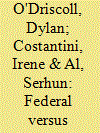

|
|
|
|
|
| Summary/Abstract |
This article contributes to the debate on whether federalism leads to ethnic accommodation and is peace-preserving through comparing the methods of ethnic accommodation in federal and unitary states. Rather than focusing on a large dataset, this article offers an in-depth picture of the role the two systems play in ethnic accommodation, offering a more nuanced understanding. The Kurds (Iraq and Turkey) and Tamils (India and Sri Lanka) have been chosen as they form territorial minorities in both federal and unitary states. The article suggests that federalist states offer a degree of acceptance toward political, cultural and economic equality with ethnic minorities. However, federalism may not be the cause of ethnic accommodation; it may be on the one hand the expression of a state willing to concede cultural, political and economic equality to an ethnic minority, or on the other hand induce such behavior. Thus, federalism without recognition of such equality does not guarantee ethnic accommodation.
|
|
|
|
|
|
|
|
|
|
|
|
|
|
|
|
| 2 |
ID:
155504
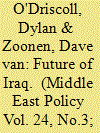

|
|
|
| 3 |
ID:
168486
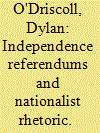

|
|
|
|
|
| Summary/Abstract |
Using the case study of the Kurdistan Region of Iraq (KRI) and the 2017 independence referendum, this article examines the nexus between independence referendums, nationalism and political power. It argues that the referendum in the KRI was held due to internal political competition and growing rebellion from the population against the poor economic performance and political situation rather than because the time was right for independence referendum. Focusing on the poor political and financial dynamics, as well as the lack of regional and international support for Kurdish independence, the article argues that independence was not a realistic goal and was rather used as a distraction amid internal turmoil. The example of the referendum in the KRI poses questions about the democratic credibility of such referenda, as the population were voting for an unachievable result and the referendum itself became a tool of internal political competition.
|
|
|
|
|
|
|
|
|
|
|
|
|
|
|
|
| 4 |
ID:
149119


|
|
|
|
|
| Summary/Abstract |
The occupation of the Iraqi city of Mosul by the Islamic State (IS)1 has become an issue of global importance. The liberation of the city is seen as a symbol for defeating IS in Iraq, and there is international pressure to achieve this. Both the Obama administration and the prime minister of Iraq, Haider al-Abadi, have been pushing for the liberation of Mosul for political reasons.
|
|
|
|
|
|
|
|
|
|
|
|
|
|
|
|
| 5 |
ID:
175531
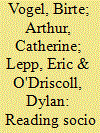

|
|
|
|
|
| Summary/Abstract |
This paper argues that graffiti can provide a form of socio-political commentary at the local level, and is a valuable, yet often overlooked, resource for scholars and policymakers in conflict-affected societies. Graffiti, in its many forms, can provide rich insight into societies, cultures, social issues, trends, political discourse, and spatial and territorial identities and claims. Thus, this, paper suggests that graffiti is a valuable source of knowledge in societies undergoing social and political transformation, to hear the voices of those often left out from the official discourses. Despite advances in the field of arts and international relations and the focus on the local and the everyday, peace and conflict scholarship and policy still lack systematic engagement with arts-based contributions and how to read them. The paper attempts to address this gap by outlining four core dimensions to consider when attempting to interpret and decode graffiti: the spatial, temporal, political economic and representative dimensions. This can also be viewed as an inquiry into the where, when, who and what. These four elements make up an analytical guide and enable scholars to better understand graffiti, and its political meaning and messaging.
|
|
|
|
|
|
|
|
|
|
|
|
|
|
|
|
| 6 |
ID:
146061
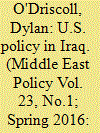

|
|
|
|
|
| Summary/Abstract |
On April 13, 2015, Mac Thornberry, a member of the U.S. House of Representatives and chairman of the House Armed Services Committee, introduced draft bill H.R.1735 — National Defense Authorization Act for Fiscal Year 2016.1 According to the committee's report on the bill, Section 1223 — Modification of Authority to Provide Assistance to Counter the Islamic State of Iraq and the Levant
|
|
|
|
|
|
|
|
|
|
|
|
|
|
|
|
|
|
|
|
|